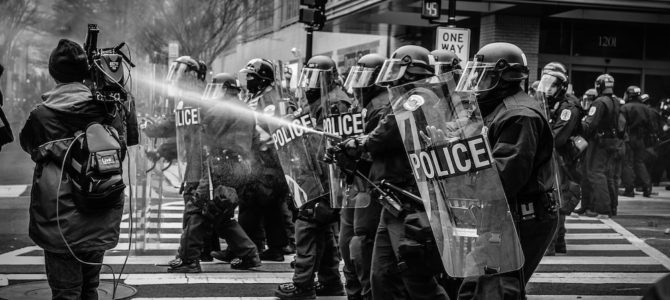On Tuesday, Sen. Mike Braun (R–Ind.) revealed a new police reform bill, The Reforming Qualified Immunity Act. It would allow public officials and law enforcement to be sued in their personal capacity and be held personally liable for any use of excessive force.
In a statement, Braun explained, “While qualified immunity originally was intended to defend government employees acting with good faith, the doctrine has expanded to protect those acting well outside the law if the allegedly deprived right has not yet been ‘clearly established’ in the relevant jurisdiction.”
Braun gave instances of when qualified immunity has been misused. For example, when an officer “assaulted and consequently broke the collarbone of an unarmed and nonviolent woman,” and when another officer “released a police dog on an unarmed person who had surrendered.”
Braun’s bill does not end qualified immunity, and it makes exceptions for actions that were permitted under federal regulation, federal statutes, and state statutes. It also exempts those whose conduct was expressly permitted under relevant case law, although the individual must be able to prove he was acting in good faith.
Braun explained, “Without any direction from Congress, our judicial branch has unilaterally created and defined qualified immunity. It’s time Congress does their job to establish a qualified immunity law that defends law enforcement, while protecting the rights of the people.” Braun continued, “To claim qualified immunity under the Reforming Qualified Immunity Act, a government employee, such as a police officer, would have to prove that there was a statute or court case in the relevant jurisdiction showing his or her conduct was authorized: a meaningful change that will help law enforcement and the citizens they protect.”
The bill would protect alleged misconduct when the courts have already weighed in on the rights violation at hand. The current interpretation of qualified immunity doctrine is that misconduct is excused because the court has not made any decision on that particular situation.
The bill has been praised by conservative and right of center organizations such as FreedomWorks, Americans for Prosperity, Justice Action Network, Right on Crime, and R Street.
The Justice Action Network commended Braun, “History will smile on Sen. Braun’s courage of conviction, and we hope his colleagues on both sides of the aisle will feel inspired to join good-faith negotiations on landmark bipartisan reforms that can begin to heal our broken nation.”
The announcement of the bill comes after the Republican bill JUSTICE Act, introduced by Sen. Tim Scott (R-S.C.), met a fiery response from congressional Democrats. Vice presidential frontrunner Sen. Kamala Harris (D- Calif.) and fellow Senate Democrats are decidedly opposed to Scott’s JUSTICE Act police reform bill. In a letter to Majority Leader Mitch McConnell, Democrats stated they would not even consider the Republican bill because they believe it falls short of their policy prescriptions and is “not salvageable.”
House Speaker Nancy Pelosi said in an NBC New Radio interview that Scott, the first black man to ever serve in both chambers of Congress, was “trying to get away with the murder of George Floyd” by introducing the JUSTICE Act.
Tim Scott, the first Black man to ever serve in both chambers of Congress, drafted the Senate GOP police reform bill. Nancy Pelosi accuses him of “trying to get away with the murder of George Floyd.” https://t.co/K9dw90IbPv
— Ben Williamson (@_WilliamsonBen) June 23, 2020
Earlier this month, Harris, Sen. Edward Markey (D-Mass.), and Sen. Cory Booker (D-N.J.) introduced the Resolution to Abolish Qualified Immunity for Law Enforcement. Following the proposal, White House Press Secretary Kayleigh McEnany made it clear that President Trump opposes ending qualified immunity.
It is yet to be seen whether Braun’s colleagues in the Senate will support his qualified immunity bill. It is also still unclear if Democrats in Congress can muster the bipartisan energy to support Braun’s bill during a contentious presidential campaign, or whether the president is likely to change his mind on qualified immunity.









